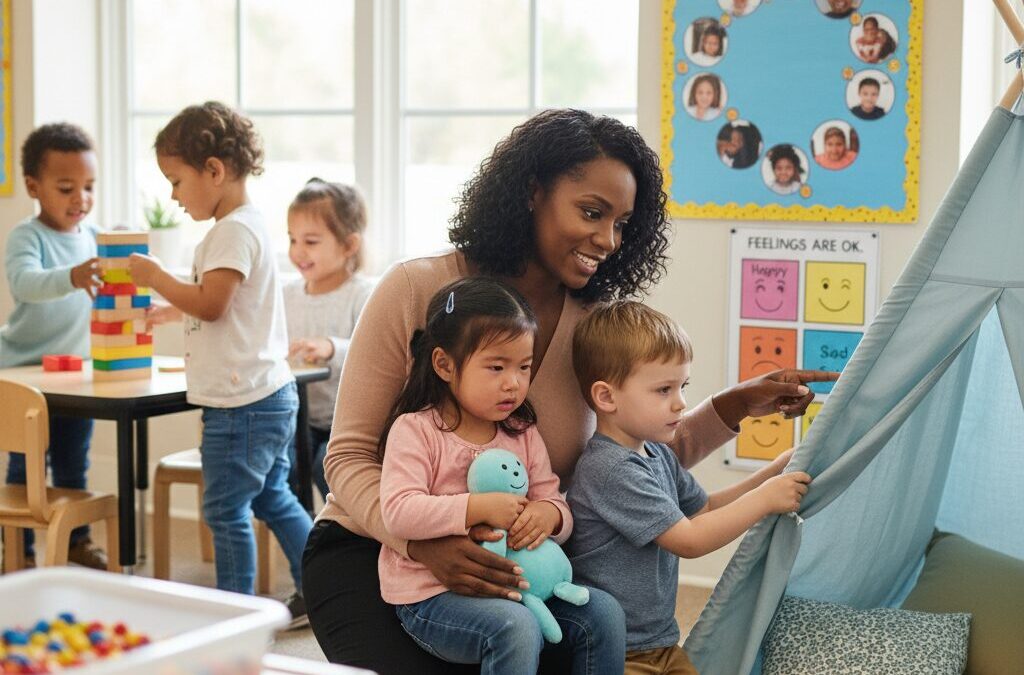Have you ever found yourself in the middle of the grocery store, negotiating with a small, tear-streaked human who is absolutely certain their life will end if they don’t get the sugary cereal? Or maybe you’re all too familiar with the morning power struggle over putting on shoes.
These moments are a universal part of parenting. They can be frustrating, exhausting, and leave you wondering if there’s a better way.
When you hear that your childcare center uses an approach called Conscious Discipline, it might just sound like another piece of educational jargon. But what it really means is that we are your partners in navigating these exact challenges—and we’re using a powerful, brain-based approach to do it.
So, what does this mean for your child, and for you?
In Simple Terms: We’re Your Child’s “Emotional Coach”
At its heart, Conscious Discipline is a shift in perspective. Instead of seeing misbehavior as a reason for punishment (like time-outs), we see it as a call for help.
When a child hits, grabs a toy, or has a tantrum, they aren’t trying to be “bad.” They are overwhelmed by a big feeling they don’t know how to manage, and they’re missing a skill. Our job isn’t to punish them for the missing skill, but to teach it. We act as their emotional coach, guiding them through difficult moments so they can learn to handle them better next time.
What This Looks Like During Your Child’s Day
When you drop your child off, you’re entrusting them to our care. Here’s a peek into how Conscious Discipline shapes their day and builds a positive environment:
- A “School Family”: We work hard to create a classroom where every child feels safe, seen, and valued. This starts with a personal greeting for each child at the door and continues with rituals that build connection and a sense of belonging all day long.
- The “Safe Place”: You might see a cozy corner in the classroom with pillows, stuffed animals, and tools for calming down. This is not a time-out chair. It’s a special spot a child can choose to go to when their feelings get too big. It teaches them the vital life skill of recognizing when they need a break and learning how to self-soothe.
- We Use Our “Big Voice”: We teach children to advocate for themselves respectfully. Instead of tattling or using physical force, we empower them with words. You’ll hear them practicing phrases like, “I don’t like it when you take my toy. Please give it back.”
How This Helps at Home (The Real Magic!)
This is where the partnership comes in. The skills your child is learning at school don’t stay locked in the classroom. They come home with them!
- Fewer, Shorter Tantrums: By learning to identify their feelings (anger, frustration, sadness) and use calming strategies, children become better equipped to manage emotional storms.
- Better Problem-Solving: Conscious Discipline focuses on solutions. When two children want the same truck, we guide them: “I see two friends and one truck. This is a problem. What can we do to solve it?” This practice helps build critical thinking and cooperation skills that can reduce sibling squabbles at home.
- A Stronger Connection: This approach is built on connection, not fear. When we validate our children’s feelings—even when we have to set a limit on their behavior—we strengthen our bond and build trust.
Three Simple Ways to Try It Tonight
Want to bridge the gap between school and home? You don’t have to be an expert. Try one of these simple strategies:
- Be the Calm You Want to See: When your child is escalating, take a deep breath yourself. Your calm presence is the most powerful tool you have to help them become calm. Remember the airplane rule: put on your own oxygen mask first.
- Offer Two Choices: Give your child a sense of power in a positive way. Instead of “Put on your shoes now!” try, “It’s time to go. Do you want to wear your sneakers or your boots?” (Make sure you’re happy with both options!)
- Acknowledge the Feeling: You don’t have to agree with the feeling to validate it. Before you correct or redirect, connect. “You are so angry that it’s time to turn off the tablet. It’s hard to stop when you’re having fun.”
Conscious Discipline is a journey, not a destination. By working together, we can help our children build a foundation of emotional intelligence that will serve them for a lifetime. We’re not just getting them through the day—we’re preparing them for the world.


Recent Comments